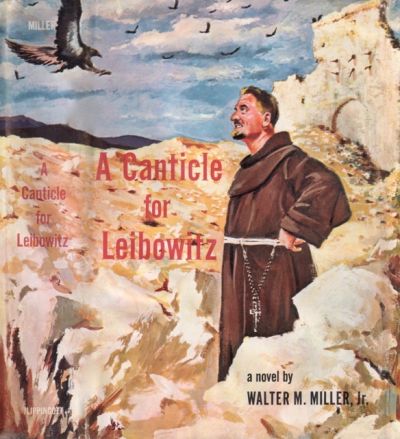Walter M. Miller had a reasonably successful career in the 1950s. In 1955, Miller’s The Darfstellar won the first Hugo for best novella ever granted. His career was in a sense capped by the publication of the three novellas that in slightly modified form became his post-apocalyptic novel, Canticle for Leibowitz (reviewed here). Canticle for Leibowitz overshadows the rest of Miller oeuvre to the extent I suspect for many readers it is the only Miller of which they are aware.
In 1981, John Reeves adapted the novel to radio drama form. The fifteen part serial ran on NPR.Under director Karl Schmidt, it was produced by him with Marv Nonn. Carol Cowan narrated the production. It is, I think, a very fine adaptation of a justly classic work. But what will my young readers think of the first episode?
This feels weird to discuss on its own. It is very much the first chapter of a book, and while it starts a story, it doesn’t get very far into it.
Having said that, it does very firmly establish the setting and state of the world of the story, by using that prologue bit at the beginning. Based on the introduction it sounds like this was a novel first, and then adapted to a serialization, and I’m curious if the prologue part was part of the original novel, or if it was added to hook in listeners since so little of the actual story was revealed in the rest of the episode.
I was interested by it, but for me it suffers from having seen too many versions of this already. Even if post-apocalyptic societies where a limited few hold on to knowledge they don’t understand was more original when this was written, I’m still not interested enough to find the rest of the story.
It’s hard to talk about the characters or plot, since there isn’t much of either in this first episode. That’s not a criticism, it does a good job setting up the type of story it wants to tell and the world it’s telling it in, but it makes forming opinions about it difficult.
—Mikayla
The concept of this serial being a history of humanity preserved as a story is an interesting concept. As the concept fleshes out, it becomes less interesting. This story is what I imagine listening to sermons is like. I wouldn’t know. I grew up in a largely atheistic household, and my mother was particularly anti-Catholic. (There’s nothing quite like mean Catholic nuns at Catholic school in the Caribbean to help a person grow up to be anti-Catholic.)
The destruction of civilization, politics, and scientific expertise seems uncomfortably relevant to today’s current political and economic world. Apart from that, the set-up seemed like the regular post-apocalyptic, World War III setting so commonly used in the Cold War era. I did enjoy the ominous hint of a potential above-ground vs. below-ground dichotomy, but I suspect this is not an important plot point.
I liked the establishment of the anti-Fahrenheit 451 monastic order. I especially appreciated the clever “bookleggers” pun, which very much appeals to my inner bibliophile. The concept of “memorisers” seemed very much like The Giver (apart from the lack of idyllic utopian world).
The overlapping audio layers were interesting, and I appreciated the things that aren’t possible while reading a story. The bits of background music and dialogue were really well done, in particular in terms of how they were balanced with the narration. It was a very good audio production.
I felt as if I missed things, so I listened to it twice. I imagine following a radio serial would have been tricky. I get to listen to my audio entertainment wherever, whenever, as many times as I like, at whatever speed I like. Not that long ago, this is how we watched TV shows, but I’ve rapidly become acclimated to on-demand streaming for my entertainment.
Overall, I would rate this radio episode as mildly interesting, and at least interesting enough that I looked up more information about the book. However, I don’t really feel like it’s for me because of the very religious tone and the suspicion that listening to all of the episodes might turn out to be sleepy torture for me. Apart from the religious tone, it seems very similar to other post-apocalyptic dystopian fiction, which is not a big motivator for me to keep listening. Been there, done that.
—Mel

